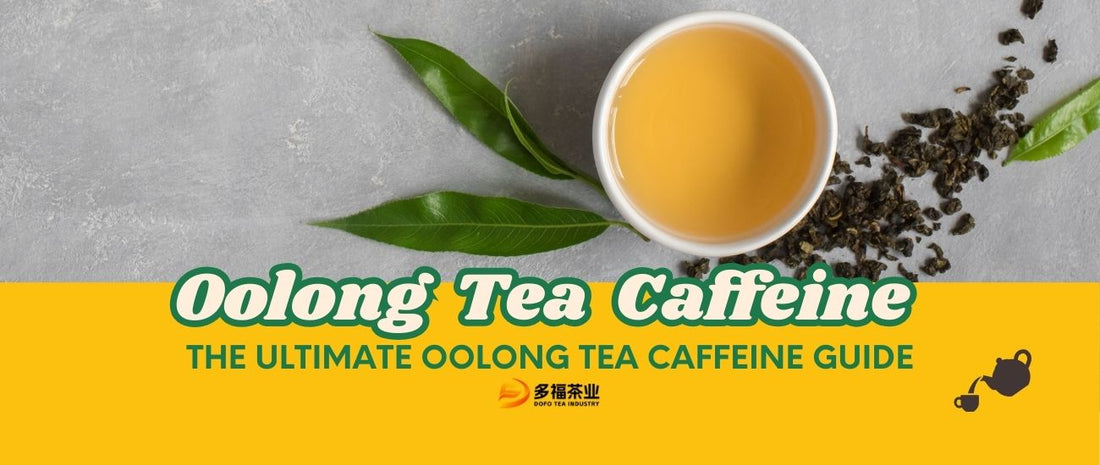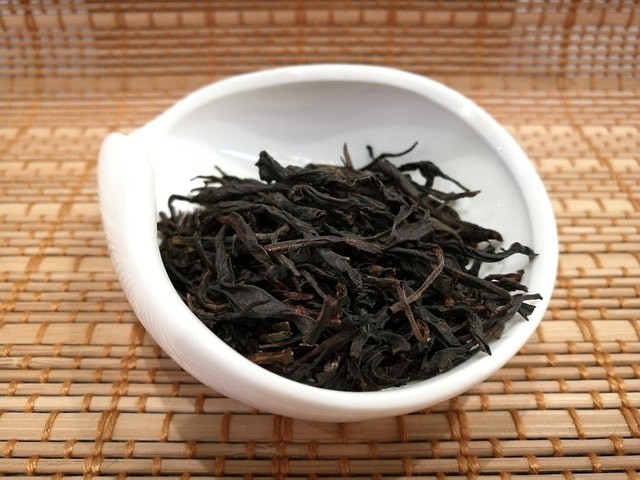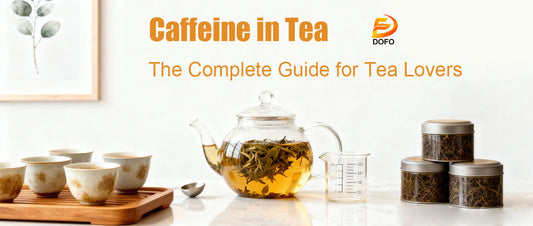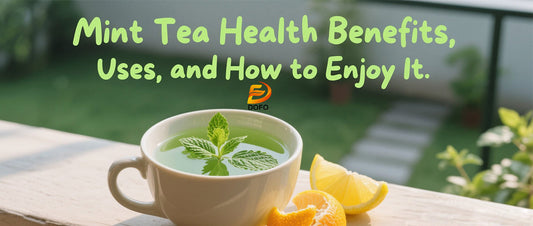
Does Oolong Tea Have Caffeine? The Ultimate Oolong Tea Caffeine Guide
Sorla LauShare
We all know that drinking oolong tea offers many benefits, but some people worry about consuming too much caffeine. Does oolong tea contain caffeine? How much is there? Are there ways to reduce the caffeine content without compromising its flavor? Let`s learn about oolong tea.
How Much Caffeine Does Oolong Tea have?
Oolong tea does contain caffeine, with its levels varying based on several factors, including the specific type of oolong, the brewing time, and the water temperature.
Oolong tea generally contains between 12 to 18 mg of caffeine per 100 ml.
Understanding Caffeine Levels in Oolong Teas
What is the caffeine content in an 8oz cup of oolong tea?
An 8-ounce cup of oolong tea typically contains between 28 to 42 milligrams of caffeine.
The exact amount can vary widely depending on the specific type of oolong tea and its brewing conditions.
Daily Intake Recommendations
The European Food Safety Authority recommends a maximum daily caffeine intake of 400 mg, which translates to about 6 cups of oolong tea (250 ml each)for most individuals without adverse effects
What Is the Exact Caffeine Content in Oolong Tea?
The exact caffeine content in oolong tea can vary based on factors like the specific variety of oolong, how it's processed, and how long it's steeped.
However, here are general ranges for the caffeine content in a standard 8 oz (240 ml) cup of oolong tea:
- Lightly oxidized oolong tea: 20-40 mg of caffeine per cup
- Moderately oxidized oolong tea: 40-50 mg of caffeine per cup
- Heavily oxidized oolong tea: 50-55 mg of caffeine per cup
What are the caffeine levels of different oolong tea varieties?
Different oolong varieties have different caffeine levels.
|
Tea Type |
Caffeine Content (mg per 8 oz) |
|---|---|
|
Dancong Tea |
Approximately 20-30 mg |
|
Tieguanyin |
About 30-50 mg |
|
Cinnamon Oolong |
Typically around 20-30 mg |
|
Golden Peony |
Approximately 30-40 mg |
|
Yellow Rose |
Typically around 30-40 mg |
|
Dahongpao |
About 30-50 mg |
Where Does the Caffeine in Oolong Tea Come From?
The caffeine in oolong tea, like all tea, comes from the Camellia sinensis plant, which naturally contains caffeine in its leaves.
The concentration of caffeine in oolong tea is influenced by several factors, including:
Tea leaves
The age and part of the plant used can affect caffeine levels. Younger leaves and buds tend to have higher caffeine content.
Processing method
Oolong tea is partially oxidized, which affects its flavor and caffeine content. The level of oxidation (how much the leaves are allowed to ferment) can slightly influence how much caffeine is retained in the final tea.
Growing conditions
Factors such as the altitude, climate, and soil where the tea is grown also affect the caffeine content in the leaves.
Which tea has the most Caffeine?
Which Chinese Tea Has the Highest Caffeine Content?
Among Chinese teas, black tea typically has the highest caffeine content.
The caffeine levels in black tea are generally higher because of the full oxidation process during its production.Oolong caffiene level is between green and black teas.

Here’s a rough comparison of caffeine content across popular Chinese teas:
Black Tea : Highest caffeine content due to full oxidation.
Oolong Tea : Moderate caffeine content, as it is partially oxidized.
Green Tea : Lower caffeine content since it undergoes minimal oxidation.
White Tea : Usually has the least caffeine, as it is the least processed.
Is Oolong Tea Considered High in Caffeine?
Oolong tea is moderate in caffeine compared to other teas. It falls between black tea (which has the highest caffeine content) and green tea (which has lower caffeine levels).
On average, an 8 oz (240 ml) cup of oolong tea contains around 30 to 50 mg of caffeine, which is less than a typical cup of black tea but more than green or white tea.
How to lower caffeine content during Oolong tea consumption?
People who are sensitive to caffeine, but still enjoy drinking tea,here are the way to lower oolong caffeine:
Amout of tea leaves
Reducing the amount of tea leaves used can also help lower the caffeine content in each cup of tea.
Less Tea, Less Caffeine
By simply using fewer tea leaves, you’ll automatically reduce the caffeine concentration in your brew. Instead of the typical 1 teaspoon of leaves per cup, try using ½ teaspoon for a lighter, less caffeinated tea.
Steeping time
The longer you steep your oolong tea, the more caffeine will be released into the water. Controlling the steeping time can significantly lower the caffeine levels:
Shorter Steep Times
For a lower caffeine cup, aim to steep oolong tea for only 1-2 minutes instead of the typical 3-5 minutes. The majority of caffeine is released in the first minute of steeping, so shorter brewing times reduce overall caffeine content.
Rinsing the tea leaves with Boiling water
Rinsing the oolong tea leaves before brewing is another effective way to lower caffeine.
A quick rinse can eliminate approximately 20-30% of the caffeine. After rinsing, you can brew the tea as usual with lower caffeine content but with a minimal effect on flavor.
How It Works?
Pour hot water (around 200°F or 93°C) over your tea leaves and let them sit for 20-30 seconds before discarding the water. This "rinsing" process will release some of the initial caffeine, allowing you to reduce the amount that ends up in your final brew.
Oolong tea caffeine vs Coffee
Is Oolong Tea a Lower-Caffeine Alternative to Coffee?
Oolong tea can be considered a lower-caffeine alternative to coffee.
The caffeine content in oolong tea is typically much lower than that in coffee.An 8 oz cup of coffee generally contains about 95 to 200 milligrams of caffeine.
Oolong teas making it a more moderate option for those looking to reduce their caffeine intake without giving up a stimulating beverage altogether.
Recommended Oolong Tea
Consuming oolong tea are so much health benefits .There are many varieties of oolong tea, and here are the most popular oolong tea recommendations。
Dancong Tea

Dancong oolong tea, particularly the Phoenix Dan Cong, is known for its unique and complex flavor profile.
- Weight:500 g
- Price:400 USD
Tieguanyin
Tieguanyin oolong tea is one of most famoust China oolong tea leaves in th, also known as "Iron Goddess of Mercy," offers a diverse and complex flavor profile that can vary significantly based on its processing style.
Cinnamon
Cinnamon oolong tea offers a unique and delightful flavor profile that combines the characteristics of traditional oolong with the warm, spicy notes of cinnamon.
Golden Peony
Golden Peony oolong tea, also known as Jin Pei or Golden Peony Rock Oolong, has a distinctive and appealing flavor profile.
Yellow Rose
Yellow Rose oolong teahas a distinctive and appealing flavor profile.
Dahongpao
Dahongpao oolong tea is one of the most famous and sought-after oolong teas from the Wuyi Mountains in China. Its flavor profile is rich and complex.











